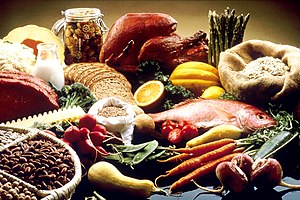| AV Number: AV-8812-3430 . (Photo credit: Wikipedia) |
Healthy Living: Healthy Fats Won’t Make You Fat
Today's post is from contributor - Natasha Gelder. Natasha is a full time Literature student based in Leeds who is juggling the quests for higher education, money and rock hard abs. She believes exercising is a vital part of a healthy, balanced lifestyle and should not be seen as a chore. You can find her blog hereThere seems to be a lot of confusion over the food group ‘fats’, with most people assuming that all fats are bad for them. Many people seem to believe that eliminating all fat from their diet is the best way to lose weight quickly and effectively. Contrary to popular belief, this is not the case. Fats are actually an essential part of our everyday diet and are needed to help maintain a healthy lifestyle, however, only some fats are beneficial to us and should be eaten regularly; this is where the confusion regarding which types of fats you should be eating seems to stem from.
Some fats are bad for you in the sense that they are high in calories and if you consume a lot of them, you run the risk of obesity and all the serious health problems that go hand in hand with it, with diabetes and coronary heart disease being examples of these. The other type of fats may also be high in calories but they are extremely high in the vitamins and minerals that your body needs, as well as providing your body will the essential fatty acids it needs to function normally. We need these ‘good fats’ in our body and should eat food containing them on a regular basis, whereas we should eat ‘bad fats’ in moderation and try not to overindulge in these.
So, how can we work out which fats are ‘good’ and which are ‘bad’? Saturated fats are the unhealthy fats that are present in a high percentage of foods which are readily available to us, whereas unsaturated fats are the healthy fats that contribute to our bodies staying healthy when eaten regularly. There is a type of fat named ‘Trans fats’ and small quantities of this occurs naturally in dairy food and some red meat; the intake of these Trans fats, however, should be limited as consuming excessive amounts can increase the level of cholesterol in the body and can lead to coronary heart disease.
Which foods should we eat and which should we avoid? An easy way to work this out is to think in terms of whether or not a food is deemed as unhealthy; if a food is classed as bad for us then this is likely to be because it contains high amounts of saturated fat. Foods like chips, burgers, ice cream and all the other tasty stuff all contain high levels of saturated fat. As well as using these foods as treats rather than as everyday diet staples, some other ways you can reduce the amount of saturated fat you consume without drastically changing your diet include trimming the fat off meat, limiting the amount of butter you use and choosing to grill or steam food rather than fry it.
Some foods that do contain ‘good’ saturated fats that you should try to eat more of include oily fish such as mackerel and salmon, nuts, avocado and olive oil. Foods such as these provide us with a source of energy but are kind to our bodies and can contribute to us leading a healthy balanced lifestyle. It turns out that not all fats will make you fat.
Today's post is from contributor - Natasha Gelder. Natasha is a full time Literature student based in Leeds who is juggling the quests for higher education, money and rock hard abs. She believes exercising is a vital part of a healthy, balanced lifestyle and should not be seen as a chore. You can find her blog here





Comments
Post a Comment
I am very grateful for your comment. Thank you!